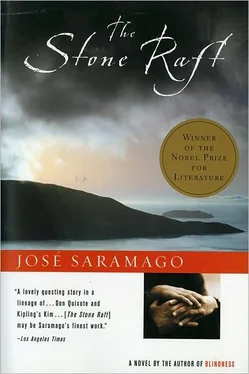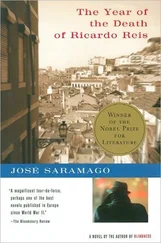All the next day Pedro Orce traveled in the driver's seat. José Anaiço and Joana Carda sat beside him and Maria Guavaira remained alone in the wagon. The horses were kept at a steady pace. When they tried to please themselves by breaking into a trot, José Anaiço restrained their impetuous speed. Joaquim Sassa traveled on foot, lagging far behind the wagon. They covered only a few kilometers that day. It was still midafternoon when José Anaiço brought Deux Chevaux to a halt in a place that looked exactly like the other, it was as if they had never got around to leaving or had come full circle, even the trees looked the same. Joaquim Sassa did not appear until much later, as the sun was setting over the horizon. On seeing him approach, Pedro Orce withdrew, the trees soon concealed him and the dog went after him. The campfire sent up great flames, but it was still too early to prepare supper. Besides, the soup was ready and there were sausages and eggs left over. Joana Carda remarked to Maria Guavaira, We didn't buy any aprons and we only have two. Joaquim Sassa told José Anaiço, I'm leaving tomorrow, I'll need my share of the money, show me where we are on the map, there ought to be some sort of railroad around here. Then Joana Carda got up and headed toward the trees where Pedro Orce had disappeared with the dog. José Anaiço didn't ask her, Where are you going. The dog reappeared after a few minutes and went and lay down under the wagon. Time passed, and Joana Carda returned. Reluctantly, Pedro Orce came with her, but she led him gently as if there were no need for much force, or perhaps it was another kind of force. They arrived in front of the campfire, Pedro Orce with lowered head, his white hair disheveled, and the flickering light of the flames appeared to dance on top of his head. And Joana Carda, whose blouse was unbuttoned and not tucked into her slacks, said quite openly and naturally, tucking her blouse in when she realized how untidy she looked, The stick with which I drew a line on the ground has lost its power, but it can still be used to draw another line here, then we'll know who is to remain on this side and who on the other, if we cannot all be together on the same side. As far as I'm concerned, I couldn't care less, I'm leaving tomorrow, Joaquim Sassa told her. I'm the one who is going tomorrow, said Pedro Orce. Just as we came together, we can go our separate ways, said Joana Carda, but if someone has to be blamed to justify our separation, don't make Pedro Orce the scapegoat. If anyone is to blame, we are, Maria Guavaira and I, and if you think what we did calls for an explanation, then we've been wrong about each other since the day we met. I'm leaving tomorrow, Pedro Orce repeated. Don't go, said Maria Guavaira, for if you leave, it's almost certain that we'll all separate, for the men won't be able to stay with us nor we with them, not because we don't love each other, but because we don't understand each other. José Anaiço looked at Joana Carda, stretched out his hands to the fire as if they had suddenly become cold, and said, I'm staying. Maria Guavaira asked, And what about you, are you leaving or staying, Joaquim Sassa did not reply at once, he caressed the dog's head as it stood beside him, then, with his fingertips, he stroked its blue woolen collar, then the bracelet around his own arm, before saying, I'll stay, but on one condition. He didn't need to spell it out, Pedro Orce began speaking, I'm an old man, or at least getting on, I've reached that age when one isn't too sure, but let's say I'm old rather than young, Obviously not all that old. José Anaiço smiled, his smile somewhat bitter. Some times things happen in life that can never be repeated, he appeared to be about to continue, but sensed that he had said enough. Nodding his head, he withdrew to weep alone. Whether he wept a lot or a little, one cannot say, but to weep he had to be alone. That night they all slept inside the wagon, but their wounds were still bleeding, the two women slept together, as did the two betrayed men, and Pedro Orce, out of sheer exhaustion, slept soundly throughout the night. He had wanted to mortify himself with insomnia but nature proved stronger.
They awoke early, with the nestlings. As dawn broke, the first to emerge was Pedro Orce, from the front of the wagon, then Joaquim Sassa and José Anaiço from the back, and finally the women, as if they were all coming from different worlds and were about to meet here for the first time. At first they scarcely looked at one another, nothing but furtive glances, as if to confront another face would have been intolerable, too much to bear in their weak state after the crisis from which they had just emerged. Once they had drunk their morning coffee, an occasional word could be heard, bits of advice, a request, an order cautiously phrased, but now the first delicate problem had to be tackled, how were the travelers to accommodate themselves in the wagon, in the light of everything that now made the previous arrangement impossible. They were all agreed that Pedro Orce must travel in the driver's seat, but the men and women in open conflict could not continue to keep their distance. Try to imagine this distasteful and equivocal situation. If Joaquim Sassa and José Anaiço were to sit up front with Pedro Orce, what conversation could they possibly hold with the driver, or more embarrassing still, were Joana Carda and Maria Guavaira to ride next to the driver, what would they say to him, what memories would they evoke, and meantime, under the awning, what biting of nails would there be, the two men asking each other, What can they be saying. These are situations that make us laugh when seen from outside, but any temptation to laugh soon disappears if we imagine ourselves in the same distress that now envelops these men. Fortunately, there's a remedy for everything, death alone has yet to follow this rule. Pedro Orce was already seated in his place, holding the reins and waiting for the others to reach a decision, when José Anaiço said, as if addressing the invisible spirits of the air, The wagon can go ahead, Joana and I will walk for a bit. And we'll do the same, Joaquim Sassa announced. Pedro Orce shook the reins, the horses gave the first sharp tug, the second one was more convincing, but even had they wanted to, they could not have gone quickly this time, the road is uphill all the way, amid mountains higher on the left than on the right. We're in the foothills of the Pyrenees, Pedro Orce thinks to himself, but it's so peaceful up here that it's hard to believe this is where those dramatic ruptures we've described took place. Trailing behind come two couples, apart, obviously, for what they have to discuss is between man and woman in the absence of witnesses.
The mountains are no good for selling, especially these wares. In addition to the sparse population typical of these mountainous regions, one must take into account the terror of the local inhabitants, who still haven't got used to the idea that this side of the Pyrenees is no longer complemented or supported on the other side. These villages are almost deserted, some completely abandoned. As the wagon passes, between doors and windows that remain firmly closed, the sound of Deux Chevaux's wheels on the stony roads is lugubrious. I'd rather be in the Sierra Nevada, thinks Pedro Orce, and these magical and entrancing words filled his heart with longing, or añoranza, as the Spanish would say. If there is any advantage to be gained from such desolation, it will be that the travelers, after so many nights of discomfort, and some promiscuity, will be able to get a good night's sleep. We are not referring to the recent and particular manifestation of promiscuity, about which opinion is divided and which the interested parties have been discussing, but simply pointing out that they will be able to sleep in the houses abandoned by their owners. For while possessions and valuables were carried off in the general exodus, the beds were generally left behind. How remote that day now seems when Maria Guavaira vehemently rejected the suggestion of sleeping in someone else's house, let us hope this ready complacency is not an indication of a lowering in moral standards, but simply the outcome of lessons learned from hard experience.
Читать дальше












